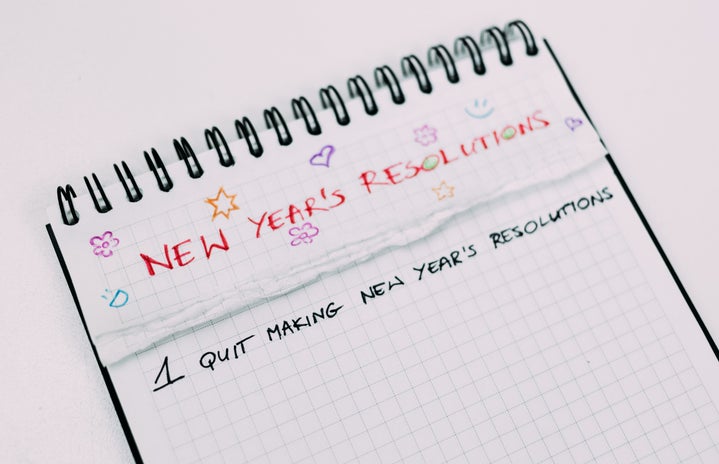It’s that time of year when people start to reflect on the past twelve months and think about how they can be better after the ball drops on New Year’s Eve. The idea of the New Year’s resolution started thousands of years ago, and today, more often than not, these resolutions are focused on self-improvement and holding ourselves accountable for things like going to the gym or eating healthier. Making goals is important in our personal and professional lives, but expecting yourself to change overnight and adopt a completely new lifestyle (usually the expectation of a New Year’s resolution) is setting yourself up for disappointment.
Of course, it’s great to recognize places in your life that you’d like to improve. As humans, we should be prioritizing our physical and mental health, and make a point to take care of ourselves amidst the demands of our working and social lives. However, lifestyle changes aren’t something we should expect to happen overnight. If you are someone who, for instance, is used to waking up later in the mornings or not being very active throughout the day, you shouldn’t expect yourself to all of a sudden go to the gym every morning six days a week. That’s a lifestyle that takes time to work up to, and you shouldn’t expect that type of change from yourself right away on New Year’s Day. In my opinion, the idea of the New Year’s Resolution needs to change because they’re often born out of something we feel guilty about, and when we don’t follow through right away we tend to feel more guilty later. It’s a vicious cycle that doesn’t accomplish much. However, this doesn’t mean that setting goals for self-improvement is a bad thing–there’s just a more realistic way to go about it.
Write It Down.
This is simple, but so necessary. By neglecting to write down your goals and keep them in your headspace only, it’s so easy to forget about them. Keep a journal or a notes page in your phone with the goal(s) you’re wanting to achieve so you can revisit them whenever you want and keep yourself on track and held accountable.
Set Goals That You’re Excited About.
When trying to set goals for yourself, you should deeply consider what you actually want to achieve. It’s so easy to just say “I am going to get organized next year,” but is that really something you’re excited about? Maybe it is, and that’s great and you should run with it! But if it’s not, it’s important to take a step back and recognize what’s truly important to you and is something you’ve deeply wanted to achieve in your life. It’s also helpful to recognize if this is something you want or something someone expects of you. Society is constantly pushing certain ideas of ideal lifestyles on us through social media, and it’s easy to think that’s what you want even if it isn’t. While it’s great to commit to making healthy changes in your life, you have to want to do it for it to be achieved. So, if going to the gym and lifting every morning isn’t exciting to you but you do want to add more movement into your daily routine, explore other workout options, like taking daily walks through your neighborhood. By setting goals that you truly want to achieve, you’ll have even more motivation to stick to them.
Start Small and Be Specific.
While it’s important to consider your long-term goals, your New Year’s Resolution doesn’t need to be some big extravagant thing that decides your entire future. This just puts more pressure, stress, and anxiety on you. Instead, start with one specific goal, and be specific about it. If your goal is to take up a new hobby, like pottery for example, instead of saying “I will learn how to make pottery,” change it to something smaller like “I will attend a pottery class twice a month starting by the end of January.” This is ultra-specific and small enough so that it feels attainable and not as daunting. It provides a way to achieve your goal that’s doable and gives you a time to get it done by, so you have some pressure to start.
Be Realistic.
This is my biggest struggle in setting my own goals. It’s easy to get carried away when thinking about our dreams and it can be hard to stay realistic. For example, I’ve wanted to go back to Europe since studying abroad and have plans to hopefully go back with a friend this summer. Ideally, I wanted to go for months and travel the whole continent, but I’ve had to take a step back and think if that’s really possible for me based on where I am right now in my life. Maybe in the future, that’s something I can achieve, but I am talking about taking this trip within the next five months so I’ve had to consider my budget, my job, my current living situation, and other commitments I have that could affect how long we go to Europe for. This is all important to consider when making goals for yourself too. If it’s not realistic based on what your life looks like at this moment, it will make it so much harder to be able to follow through. For example (sticking with learning how to make pottery), maybe attending classes twice a month is too much for your schedule or not in your budget, so instead, you change this to once a month. Or you have more than enough time and want to up your goal to three times a month. Base your goals off of your reality.
These are only four suggestions for setting goals that you can truly accomplish. Check out this article for some other ideas to help you stick to your resolutions if you’re still feeling stuck.
The idea of the New Year’s Resolution is a good thing because it does put the thought in our minds of taking care of ourselves (something we too often overlook). However, this idea of feeling like you need to “better” yourself right away on New Year’s Day is harmful to our mental health and often leads us to feel disappointed when we find that we’re not achieving these resolutions by the end of January, and that shouldn’t be the case. In order to alleviate that feeling, setting realistic goals with these tips should be something to keep in mind. And even if you do still find yourself struggling to meet your personal goals, it’s important to remember that this is okay too! Everyone grows at their own pace and it can take months to adopt different lifestyles or make changes in our lives because we’re only human and can only do so much at once. What’s truly important about goals and New Year’s Resolutions is that you’re making them in your best interest and taking the time to put yourself first, no matter how that looks.


